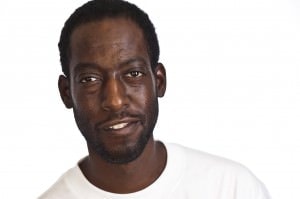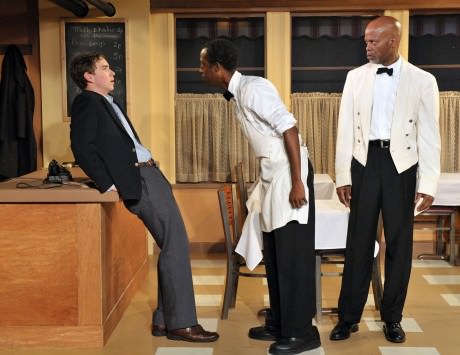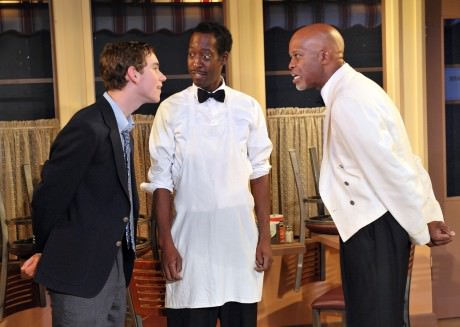This is Part 3 of my series of 3 interviews with the cast of “Master Harold”. . . and the boys at Bay Theatre Company.

The innovative and versatile Baakari Wilder, delights as “Willie” in “Master Harold” . . . and the boys in his Bay Theatre Company debut in Annapolis, MD. Internationally renown as Savion Glover’s understudy and eventual replacement in the Broadway production of Bring in ‘da Noise, Bring in ‘da Funk, this accomplished performer has appeared as a dancer in Spike Lee’s film Bamboozled, and his dancing has delighted audiences at The Kennedy Center, The Smithsonian, Carnegie Hall, and Jazz @ Lincoln Center, among others.
Don’t miss your final opportunity today to see one of the most provocative and unforgettable productions that I have seen all year, ‘”Master Harold”. . . and the boys, directed by Richard Pilcher.
Sydney-Chanele: Please tell me about your character, Willie. What attracted you to this role?
Baakari: Actually, I’ve gotten a lot from your review – it was very inspiring – and from the different writers and their perspectives. Reading the different reviews about my character from all of the writers, has actually made me think a little and made me give some more thought to what was written about my character. It has given me a different viewpoint.
How did the reviews differ from your own interpretation of Willie?
The breakdowns about how people saw Willie as this abusive character, and the logic behind his abusiveness and the abuse in society with apartheid . . . The way at times we take our aggressions out on others, people close to them, even as they are being oppressed themselves – the cycle of abuse. So that was fuel . . . I didn’t see Willie that way, but I don’t always put things to words literally that way. So your language as a writer in your review was wonderful.
Thank you. As an actor, you are always interpreting writing . . .
Right. Right. Right. Yes, I am always interpreting and trying to piece together the writing and the actions, and the relationships. And I’m trying to put that all together with everyone else’s dialogue in the mist of that and everything else in between. I want to see what bounces off, and I want to see what Willie is affected by. That helps me shape the character and his relationship with other people.
What did you do to create the character that we see on stage?
Well, after reading the play, several and several times over ( He says sheepishly, and smiles), I guess I had to take into account what this whole dancing thing meant, because that was a whole journey into itself. Actually, the first thing was figuring out how I fit amongst the two . . . in terms of status. I gathered that Willie was not quite on that same level of intellect as Sam was. I’m not saying that he was stupid or ignorant or anything like that . As an actor, I try to do a lot to figure the background, and the history of the character, and what my character knows. I start from there, and then I bring the character to where they are now.
Just trying to figure out Willie’s history ( shaking his head) . . .
So, what history did you create for Willie?
Well, they (Sam and Willie) talk about them knowing so much about being in jail. I decided that Willie had been there before and possibly had even met Sam there. This would explain why they have this certain kind of friendship. But even prior to that, what got him in jail? . . . his youthfulness. I think he probably came from a very poor family, which may have led to fighting for food, which might have even landing him in jail. Meeting someone like Sam in jail gave him a little more focus in doing right. Yet, because he didn’t quite have the tools or education to find work, I actually decided that Sam was the one who helped him get this job ( at the Tea Shop) in particular. I don’t think Willie was the kind of person who would have known how to seek out that type of position.
On his own, he probably would have come out of jail and end up struggling again. Sam likely encouraged him to get this job, and in that way they are connected. He is indebted, and looks to Sam as a mentor. He is a good friend, mentor, and respected person. He knows where his place is in terms of apartheid and dealing with white Afrikaans – that has been beaten into his understanding. It is natural for him to respect the younger Hally and know how important that is for the sake of Hally’s parents who were in charge.
What is the significance of ballroom dance to Willie in this play?
Ballroom dancing is probably the only specific joy that Willie has, or has discovered by being introduced to Sam. That’s why I think Willie in a lot of ways is focused on trying to be a part of that. I imagine that Sam has probably taken Willie to one of those events. And, with him not being so cordial with the ladies . . . Um, He has a strong desire, but he does not know how to get it. Willie sees ballroom dancing as his key to getting the ladies – and this is the environment where the ladies are. Willie doesn’t know how to talk to ladies or approach them. He thinks ‘I’m poor, I’m broke, if Willie learns how to dance just this one way, then this is one way I can step up to the plate.’
But something tells me his fondness for ballroom isn’t just for the ladies. He kinda enjoys this new activity.
Yes. He likes being able to express himself. It’s probably a different type of freedom. Movement is a different and new type of experience for him. He’s never moved or used his body in that way. Fred Astaire and Ginger Rogers are mentioned, I think he enjoyed watching their movements and their grace. Seeing other people in the Ballroom, the same color as him moving like Fred and Ginger probably inspired him too.
What are your impressions of Athol Fugards’ writing? Talk about Fugard using ballroom dancing being used as a metaphor for life in “Master Harold” . . .and the boys.
I think it’s beautiful the conversation Sam and Hally have. Being a dancer myself it makes a lot sense, because I’ve hung around great dancers who talk nothing about life. It refers a lot to the dance itself. It’s extremely clear. It’s genius. I think it’s actually wonderful.
I haven’t been asked that. So it’s good that you asked me that… You’ve got me thinking… Actually, I have to say it’s pretty brilliant of Fugard to use ballroom dance as a metaphor. Dancing is something that we as executors of it or observers of it can relate. It touches everybody in a certain way, so it’s right to parallel – the colliding, bumping… getting things right.

Did you (Do you) think of Willie as an abuser when you were creating your character?
I think of Willie as someone who is frustrated . . . and he’s oppressed to the point where he – that’s where the frustration comes from. He’s trying to make it, and that abuse came out of frustration. I think it just happen. I don’t think Willie is an abuser. What makes an abuser an abuser? Where does that come from?
I think in a lot of ways, Willie is more “upset.” I think it makes a lot of sense for Willie, that the level of oppression and abuse that he’s been treated in the real world and even in prison, could naturally come to someone weaker than he. That he would transfer that (abuse) and he takes it out on someone – you know – that’s what he was upset about.
I don’t think Willie is a great dancer . . . And, I can’t see Hilda really making mistakes – but I see her trying her hardest not to upset Willie with anything. She fails at that, and so that’s enough. It’s not necessarily her making mistakes. Truthfully Willie probably isn’t even knowledgeable enough to even know if she made a mistake. She’s just not moving how he wants her to move at the moment.
What work and research did you do to prepare your South African dialect?
Even before I began working with the Dialect coach, I started listening to South African radio. That was fun. The accent was something that I really wanted to get down. People told me that it was going to be tough.
Was it difficult?
Not after a while. I put in the work. I played a lot in my car, I had the dialect coach, I listened, and I did a lot of rehearsing. I love preparing for a role. I also watched a lot of films – Cry the Beloved Country, Sarafina, White Wedding . . . listening to the accents. That was very useful.
How would you describe your acting style?
It’s strange. I make the best effort to get those lines down as soon as possible because it’s easier to discover things. I construct my characters by trying to figure out their personalities. I make decisions about who they are, how they are and how I think they perceive themselves – and I get those clues from the text. Then what I do is read The Actor and the Target over and over again, because that helps. Reading that specifically helped with the emotion in the groaning scene. I had to work on – attention. Attention versus Focus. (That’s a chapter in the book.) They compare the two terms , and explain that when you focus on something too hard you shut out everything else that is going on around you. But when you are paying attention – your scope is bigger and you are able to see more and get targets that you respond. So I was working on staying attentive ( as opposed to just focusing), and that’s how I, the actor, stayed alive on stage.
Being here at Bay Theatre Company, we have been fortunate enough to do what feels right. There was no “Move here, stand there, go to this spot.” And, it’s rare that you get to rehearse on the same stage that your performing
What has this production experience taught you?
I learned that I can definitely trust them (the cast) on the stage. I learned even more about being attentive, because they will try things that come naturally to them – and I learned how I can join in and be a part of that. You know, we really play off each other very well.
This has been a great experience, and I hope I get to do something else this great.

“Master Harold”…and the boys has one remaining performance – today at 2:00 P.M. at Bay Theatre Company – 275 West Street, in Annapolis, MD. To order tickets, call (877) 503-9463, or purchase them online.
LINKS
Part 3: An Interview With “Master Harold” … and the boys’ Baakari Wilder by Sydney-Chanele Dawkins.
Part 2: An Interview With “Master Harold” … and the boys’ Michael Anthony Williams by Sydney-Chanele Dawkins
Part 1: An Interview with Sean McComas of ‘Master Harold”…and the boys’ by Sydney-Chanele Dawkins.
Review of “Master Harold”…and the boys by Sydney-Chanele Dawkins on DC Theater Arts.
VIDEOS
(In the final video the Tony Awards, look for Baakari in the long, light coat – the third dancer).




